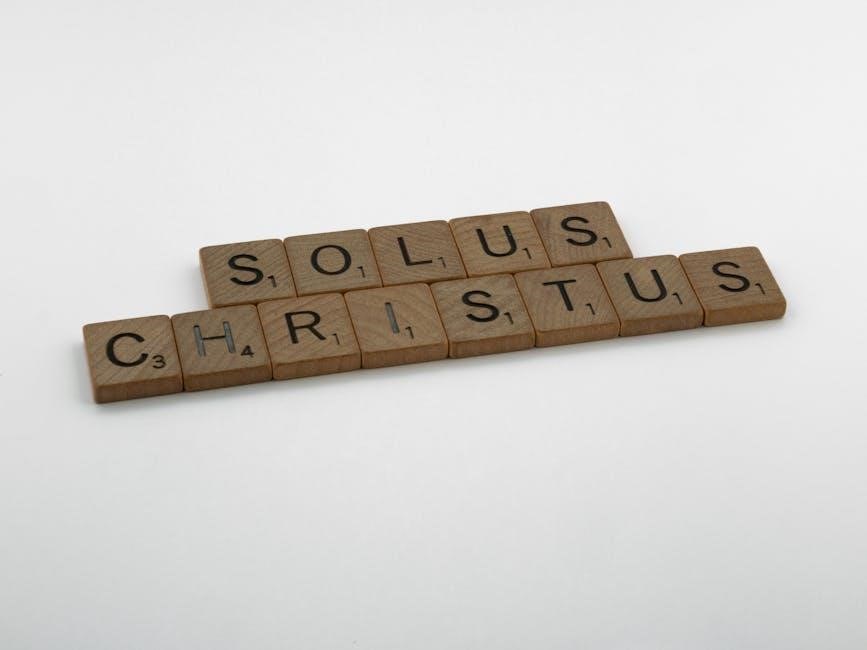Luther’s Small Catechism, published in 1529, is a foundational text of Lutheran Christianity, providing essential teachings on faith, worship, and daily life. Its Luther’s Catechism PDF versions offer modern accessibility, preserving its timeless relevance for spiritual guidance and education.
1.1 Historical Background of the Small Catechism
Martin Luther’s Small Catechism, published in 1529, emerged during the Protestant Reformation. Recognizing the widespread ignorance of biblical teachings, Luther created a concise guide to educate laypeople, especially children and servants. The catechism was groundbreaking, as it provided simple, accessible instruction in the Christian faith. Its structure included explanations of the Ten Commandments, the Apostles’ Creed, the Lord’s Prayer, and the sacraments, along with practical household responsibilities. This work became a cornerstone of Lutheran education and worship, shaping the theological and liturgical practices of the Lutheran Church. Today, its legacy continues, with Luther’s Catechism PDF versions ensuring its enduring accessibility for modern learners.
1.2 Purpose of the Small Catechism
The Small Catechism was written by Martin Luther to provide a clear, accessible guide for teaching Christian doctrine to laypeople, especially children and servants. Its primary purpose was to simplify complex theological concepts into understandable language, ensuring that everyone could grasp the essentials of the faith. It covered core topics such as the Ten Commandments, the Apostles’ Creed, the Lord’s Prayer, and the sacraments. By structuring it in a question-and-answer format, Luther aimed to make it easy for families and pastors to use in daily devotion and instruction. The catechism also sought to reform the church by ensuring that Christian education was widespread and deeply rooted in Scripture. Its enduring popularity is reflected in its availability as a Luther’s Catechism PDF, making it accessible for modern learners.
1.3 Importance of the Small Catechism in Lutheran Tradition
The Small Catechism holds a central place in Lutheran tradition as a concise summary of Christian doctrine and practice. It has served as a cornerstone for religious education, shaping the faith of generations. Its emphasis on the Word of God, the sacraments, and daily living reflects Luther’s vision of a priesthood of all believers. The catechism’s accessibility has made it a vital tool for both personal devotion and communal worship. Today, its availability in Luther’s Catechism PDF formats ensures its continued relevance, allowing it to remain a guiding resource for Lutherans worldwide. Its enduring influence underscores its role as a unifying and transformative text within the Lutheran Church.

Structure and Content of Luther’s Catechism
Luther’s Small Catechism is structured around key Christian teachings, including the Ten Commandments, Creed, Lord’s Prayer, Baptism, and Sacrament, guiding believers in faith and practice.
2.1 The Ten Commandments
Luther’s Small Catechism begins with the Ten Commandments, emphasizing their role as a foundation for moral and spiritual living. Each commandment is accompanied by explanations that highlight its significance and practical application. For instance, the Eighth Commandment, “You shall not give false testimony against your neighbor,” is elaborated to teach honesty, fairness, and kindness. The catechism encourages believers to fear and love God, ensuring they uphold these principles in daily life. The commandments serve as a guide for personal conduct and relationships, fostering a life of integrity and faithfulness to God’s will. This section is widely available in Luther’s Catechism PDF formats, making it accessible for study and reflection.
2.2 The Apostles’ Creed
The Apostles’ Creed is a central element in Luther’s Small Catechism, serving as a concise summary of Christian doctrine. It is divided into three articles, each focusing on a person of the Trinity: God the Father, Jesus Christ, and the Holy Spirit. The catechism provides explanations for each article, helping believers understand their faith. For example, the first article emphasizes God as Creator and Sustainer, while the second highlights Christ’s redemptive work. The third article underscores the Holy Spirit’s role in sanctification and eternal life. This section is widely accessible in Luther’s Catechism PDF formats, offering a clear and structured guide for personal devotion and communal worship.
2.3 The Lord’s Prayer
The Lord’s Prayer is a cornerstone of Christian devotion, and Luther’s Catechism provides a detailed explanation of its seven petitions. It emphasizes God’s holiness, His kingdom’s coming, and daily bread, while seeking forgiveness and protection from evil. Luther’s exposition helps believers understand the prayer as a guide for all circumstances. The catechism also highlights the prayer’s role in expressing trust in God’s providence and mercy. Modern Luther’s Catechism PDF editions retain this timeless teaching, making it accessible for personal reflection and communal worship, ensuring the prayer’s enduring relevance in Lutheran tradition and practice;
2.4 Holy Baptism
Holy Baptism is a sacred act where water is combined with God’s Word, symbolizing spiritual cleansing and new life in Christ. Luther’s Catechism explains Baptism as a divine work that washes away sin and grants the Holy Spirit. It emphasizes Baptism as a lifelong covenant, where believers are united with Christ’s death and resurrection. The catechism teaches that Baptism is not merely a ritual but a powerful means of grace, nurturing faith and strengthening believers. Modern Luther’s Catechism PDF editions highlight this sacrament’s role in initiating individuals into the Christian community, providing a foundational understanding for Lutheran theology and practice.
2.5 Confession
Confession in Luther’s Catechism is a sacred act of acknowledging sins before God and receiving forgiveness through faith in Christ. It emphasizes the importance of repentance and the comfort of divine mercy. Luther teaches that confession involves two parts: the acknowledgment of sin and the acceptance of forgiveness. The catechism highlights the role of the pastor as a steward of the mysteries of God, offering absolution in Christ’s name. This practice is seen as a means of spiritual renewal and reconciliation; Modern Luther’s Catechism PDF editions provide clear explanations of confession, guiding believers in this vital aspect of Lutheran spirituality and its application in daily life.
2.6 The Sacrament of the Altar
The Sacrament of the Altar, as taught in Luther’s Catechism, is a sacred rite where believers receive Christ’s true body and blood in, with, and under the bread and wine. It is a means of grace, strengthening faith and forgivenessthrough the real presence of Christ. Luther emphasizes that this sacrament is a testament to God’s love and mercy, offering spiritual nourishment and unity with Christ. The catechism provides a detailed explanation of its significance, encouraging believers to approach the altar with reverence and gratitude. Modern Luther’s Catechism PDF editions offer accessible insights, preserving this doctrine for contemporary Lutheran practices and devotion.
2.7 Daily Prayers
Daily Prayers in Luther’s Catechism provide a structured way to nurture Christian devotion. They include morning and evening prayers, grace before meals, and prayers for various life circumstances. These prayers emphasize gratitude, forgiveness, and trust in God. Luther’s teachings encourage believers to integrate prayer into daily life, fostering a personal relationship with God. The catechism’s PDF versions make these prayers easily accessible, ensuring their relevance for modern Christian practice. By following these guidelines, individuals can cultivate a habit of prayer, grounding their faith in Scripture and strengthening their spiritual lives. The prayers remain a vital part of Lutheran tradition, offering comfort and guidance for daily living.
2.8 A Table of Household Responsibilities
A Table of Household Responsibilities outlines duties for family members, emphasizing mutual respect and Christian values. It guides parents, children, and servants in their roles, promoting harmony and accountability. This section reflects Luther’s belief in the sanctity of family life and its role in nurturing faith. The catechism’s PDF editions retain this practical advice, making it accessible for modern families. By adhering to these responsibilities, households can foster a God-centered environment, encouraging spiritual growth and service to one another. This timeless guidance remains relevant, offering a framework for Christian living within the home. It underscores the importance of faith in everyday life and relationships.
2.9 Christian Questions with Their Answers
Christian Questions with Their Answers serves as a concise Q&A section, addressing key theological and practical aspects of faith. It covers topics like baptism, communion, prayer, and living a Christian life. This format simplifies complex doctrines, making them accessible to all believers. The catechism’s PDF versions ensure these questions and answers remain widely available, aiding personal study and family devotion. By providing clear, biblically grounded responses, this section equips individuals to deepen their understanding and apply faith in daily life. It remains a vital tool for spiritual growth, offering guidance rooted in Scripture and Lutheran tradition. Its clarity and relevance continue to inspire and educate believers today.

Theological Themes in Luther’s Catechism
Luther’s Catechism emphasizes core theological themes such as justification by faith, the authority of Scripture, and the sacraments as means of grace. Its PDF editions preserve these teachings, ensuring their enduring accessibility for study and reflection.
3.1 The Law and the Gospel
The Small Catechism clearly distinguishes between the Law and the Gospel. The Law reveals God’s will and humanity’s sinfulness, while the Gospel proclaims salvation through Jesus Christ. Luther emphasizes that the Law convicts and the Gospel saves, a central theological theme in his teachings. This distinction is vital for understanding justification by faith and the Christian life. The Luther’s Catechism PDF editions highlight this doctrine, providing clear explanations and applications for modern readers. By studying these sections, believers gain a deeper understanding of God’s grace and their response to it in faith and obedience.
3.2 Justification by Faith
Justification by faith is a cornerstone of Lutheran theology, emphasized in Luther’s Catechism. It teaches that salvation is a free gift from God, received through faith in Jesus Christ, not through works. The Catechism explains that humanity, sinful by nature, cannot earn salvation but is justified by grace alone. This doctrine, central to the Reformation, is clearly articulated in the Luther’s Catechism PDF editions, such as the 1991 ESV version. These resources provide accessible explanations, helping believers understand their righteous standing before God through faith in Christ, transforming their relationship with Him and guiding their Christian living;
3.3 The Role of the Holy Spirit
The Holy Spirit plays a vital role in Luther’s Catechism, emphasizing His work in calling, enlightening, and sanctifying individuals. Through the Spirit, faith is kindled, enabling believers to trust in Christ for salvation. The Catechism highlights the Spirit’s role in illuminating Scripture and empowering Christians to live according to God’s will. The Luther’s Catechism PDF editions, such as the 1986 version, provide clear explanations of these teachings, ensuring accessibility for modern readers. The Spirit’s work is inseparable from the Word and Sacraments, as He brings comfort, strength, and guidance to believers, fostering a deepening relationship with God.
3.4 The Sacraments as Means of Grace
Luther’s Catechism underscores the Sacraments as divine means of grace, through which God imparts spiritual benefits. Baptism is seen as a sacrament of rebirth, uniting believers with Christ, while the Sacrament of the Altar offers the real presence of Christ for spiritual nourishment. These rituals, combined with faith, convey God’s forgiveness and strength. The Luther’s Catechism PDF editions, such as the 1986 and 1991 versions, provide detailed explanations of these teachings, emphasizing the role of the Holy Spirit in making the Sacraments effective. The Sacraments are not mere symbols but tangible expressions of God’s grace, central to Lutheran worship and life.

Practical Applications of the Catechism
Luther’s Catechism serves as a tool for teaching Christian fundamentals, fostering family devotions, and enriching worship. Its PDF versions enhance accessibility for modern religious instruction and reflection.
4.1 Teaching the Basics of the Christian Faith
Luther’s Small Catechism is a cornerstone for instructing individuals in the fundamental teachings of Christianity. It simplifies complex doctrines into accessible lessons, making it ideal for youth and those new to the faith. The catechism uses a question-and-answer format to explain key elements such as the Ten Commandments, the Apostles’ Creed, and the Lord’s Prayer. Its clear structure helps learners understand the basics of sin, grace, and salvation. Available in PDF, this resource remains a vital tool for modern religious education, ensuring the transmission of Lutheran teachings to future generations while maintaining its historical integrity and spiritual depth.
4.2 Use in Family Devotions
Luther’s Small Catechism serves as an excellent resource for family devotions, fostering spiritual growth and unity within the household. Its structured content, including prayers and biblical lessons, provides a framework for daily reflection and discussion. Parents can use the catechism to teach children the fundamentals of faith, while also reinforcing their own understanding. The availability of the catechism in PDF format makes it easily accessible for families to incorporate into their devotional routines. This practice strengthens familial bonds and ensures the transmission of Lutheran values across generations, creating a nurturing environment for Christian living and discipleship.
4.3 Role in Worship and Liturgy
Luther’s Small Catechism plays a vital role in shaping worship and liturgy within Lutheran traditions. Its structured lessons on the Ten Commandments, the Apostles’ Creed, and the Lord’s Prayer provide a foundation for congregational participation in worship services. The catechism’s teachings are often incorporated into liturgical practices, such as confessions, absolution, and communion, ensuring a unified understanding of faith among worshippers. Additionally, the availability of the catechism in PDF format has made it easier for churches to integrate its content into worship materials, enhancing the spiritual experience for both clergy and laity. This integration strengthens the connection between doctrine and practice, fostering a deeper engagement with Lutheran theology during worship.
4.4 Guidance for Confession and Absolution
Luther’s Small Catechism provides clear guidance for confession and absolution, emphasizing the importance of repentance and forgiveness. It outlines the process of acknowledging sins, seeking pardon, and receiving absolution through faith in Christ. The catechism’s teachings on this sacrament are accessible in PDF format, making it a valuable resource for both personal devotion and congregational practice. By following the catechism’s instructions, believers can approach confession with a humble heart, trusting in God’s mercy and grace. This section serves as a practical tool, ensuring that the practice of confession remains rooted in scripture and Lutheran tradition, offering spiritual comfort and renewal to those who seek forgiveness.

Availability and Access to Luther’s Catechism in PDF
Luther’s Small Catechism is widely available in PDF format, accessible through sources like Concordia Publishing House and various Lutheran church websites, ensuring easy download and study for believers worldwide.
5.1 Sources for Downloading the Small Catechism PDF
The Small Catechism PDF is available from various reputable sources, including Concordia Publishing House and Lutheran church websites. The 1986 version, widely used for internal church instruction, can be downloaded directly from official platforms. Additionally, the 1991 edition, featuring explanations in the English Standard Version (ESV), is accessible for purchase or free download, depending on the source. Many Lutheran denominations provide complimentary access to the PDF for personal or congregational use, ensuring widespread availability. These digital versions maintain the original teachings while offering convenience for modern study and reflection.
5.2 Concordia Publishing House Editions
Concordia Publishing House (CPH) offers authoritative editions of Luther’s Small Catechism in PDF format. The 1986 version is available for free download, intended for internal church use, while the 1991 edition, featuring explanations in the English Standard Version (ESV), can be purchased. Both editions include sections like the Ten Commandments, the Apostles’ Creed, and the Lord’s Prayer, along with comprehensive explanations. CPH ensures these resources remain accessible for personal study, family devotions, and congregational instruction. For ordering, visit www.cph.org or contact them at 800-325-3040. These editions preserve Luther’s teachings while adapting to modern accessibility needs.
5.3 The 1986 Version of the Small Catechism
The 1986 version of Luther’s Small Catechism is a widely recognized edition, available in PDF format for easy access. This version includes core sections such as the Ten Commandments, the Apostles’ Creed, the Lord’s Prayer, Holy Baptism, Confession, and the Sacrament of the Altar. It serves as a valuable resource for teaching the fundamentals of the Christian faith. The PDF is designed for internal use within churches, making it a practical tool for congregational instruction and personal study. Its clear structure and comprehensive content ensure that Luther’s teachings remain accessible to modern learners, preserving the catechism’s enduring relevance in spiritual education and worship.
5.4 The 1991 Edition with Explanation (ESV Version)
The 1991 edition of Luther’s Small Catechism, featuring the English Standard Version (ESV), is a comprehensive resource that combines the original text with detailed explanations. Published by Concordia Publishing House, this version is designed to deepen understanding of Lutheran theology. It includes the Ten Commandments, the Apostles’ Creed, the Lord’s Prayer, and the Sacraments, along with explanations to guide learners. The ESV translation ensures clarity and accuracy, making it accessible for modern readers. This edition is particularly valuable for personal study, family devotions, and congregational use. Its availability in PDF format enhances accessibility, allowing users to easily reference and share the catechism in various settings.

Preface to the Small Catechism
Martin Luther’s preface addresses pastors, lamenting the deplorable state of Christian education and emphasizing the necessity of catechetical instruction for faith and practice.
6.1 Luther’s Address to Pastors and Preachers
Martin Luther’s preface is a heartfelt plea to pastors, urging them to prioritize the spiritual education of their congregations. He expresses deep concern over the widespread ignorance of Christian teachings, emphasizing the critical role of catechesis in fostering genuine faith. Luther appeals to pastors to take their responsibility seriously, ensuring that the Word of God is clearly and effectively communicated. His address reflects his commitment to reform and the renewal of the Church through proper instruction. This section underscores the importance of pastoral leadership in maintaining the integrity and vitality of Christian education, aligning with the enduring purpose of the Small Catechism.
6.2 The Deplorable State of Christian Education
Luther lamented the widespread neglect of Christian education in his time, observing that many were alarmingly ignorant of basic teachings. He noted that even pastors and parents often failed to instruct their congregations and children in essential doctrines. This lack of knowledge extended to fundamental elements like the Ten Commandments, the Apostles’ Creed, and the Lord’s Prayer. Luther’s concern was not merely theoretical; he saw this ignorance as a spiritual crisis, undermining the Church’s vitality. His Small Catechism emerged as a response, offering clear, accessible instruction to address this deplorable state. Its enduring relevance is evident in its availability as a Luther’s Catechism PDF, ensuring its teachings remain accessible for modern learners.
6.3 The Necessity of Catechetical Instruction
Luther emphasized that catechetical instruction was essential for fostering genuine faith and spiritual maturity. He believed that without a solid foundation in the teachings of Scripture, individuals could not fully grasp the significance of God’s grace and the Gospel. The Small Catechism was designed to provide this foundation, offering clear explanations of the Ten Commandments, the Apostles’ Creed, the Lord’s Prayer, and the Sacraments. Luther’s approach was practical, aiming to equip both children and adults with the knowledge necessary for a life of faith. Today, the availability of Luther’s Catechism PDF ensures that this vital instruction remains accessible, continuing to nurture believers in their understanding of Christian doctrine and practice.

The Catechism and Modern Technology
Modern technology has made Luther’s Catechism widely accessible through Luther’s Catechism PDF, enabling easy sharing and study of its teachings, ensuring its enduring relevance in the digital age.
7.1 The Role of PDF in Preserving the Catechism
The PDF format has played a significant role in preserving Luther’s Small Catechism, ensuring its teachings remain accessible and intact for modern audiences. By converting the catechism into a PDF, its content is protected from formatting issues and can be easily shared across devices. This digital preservation allows for widespread distribution, enabling churches, educators, and individuals to use the catechism for spiritual guidance and education. The PDF version also maintains the original structure, including sections like the Ten Commandments, the Apostles’ Creed, and the Lord’s Prayer, ensuring authenticity. This format has been instrumental in keeping Luther’s teachings relevant in the digital age, bridging the gap between traditional and contemporary methods of dissemination.
7.2 Digital Accessibility for Contemporary Use
The availability of Luther’s Small Catechism in PDF format has revolutionized its accessibility for contemporary use. Digital versions enable easy access on smartphones, tablets, and computers, making it convenient for individuals to study and reference the catechism anytime, anywhere. This format also allows for global distribution, ensuring that people from diverse locations can benefit from its teachings. Publishers like Concordia Publishing House offer downloadable PDFs, further enhancing accessibility. Additionally, digital versions facilitate easy sharing within congregations and families, promoting collective learning and devotion. The PDF format ensures that the catechism remains a relevant and accessible resource for modern Christians, bridging tradition with technology.
Luther’s Small Catechism remains a timeless guide for Christian faith and practice, offering enduring wisdom. Its availability in PDF ensures its teachings reach modern audiences, a precious gift to the Church.
8.1 Enduring Relevance of Luther’s Small Catechism
Luther’s Small Catechism, first published in 1529, remains a cornerstone of Lutheran doctrine and practice. Its clear, concise explanations of Christian teachings continue to guide believers today. The PDF format has made it accessible to modern audiences, ensuring its timeless truths reach new generations. Its emphasis on the Ten Commandments, Apostles’ Creed, and the Lord’s Prayer provides a solid foundation for faith. The Catechism’s focus on the Law and Gospel, justification by faith, and the sacraments resonates deeply, offering spiritual guidance and nurturing discipleship. Its relevance endures as it bridges the past and present, serving as a vital resource for worship, education, and personal devotion.
8.2 The Catechism as a Gift to the Church
Luther’s Small Catechism is a profound gift to the Church, offering timeless teachings that nurture faith and unity. Its clear explanations of the Ten Commandments, Apostles’ Creed, and the Lord’s Prayer provide a universal guide for Christian living. The Catechism’s emphasis on the sacraments, confession, and daily prayer enriches worship and devotion. As a PDF, it remains accessible, ensuring its message endures for future generations. This text unites believers across time and space, fostering spiritual growth and a deeper understanding of God’s grace. Its enduring value lies in its ability to inspire and educate, making it a cherished treasure for the Church worldwide.
